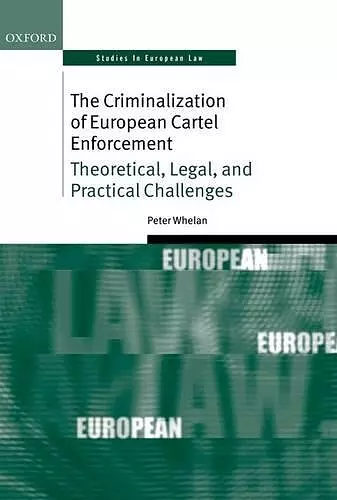The Criminalization of European Cartel Enforcement
Theoretical, Legal, and Practical Challenges
Format:Hardback
Publisher:Oxford University Press
Published:7th Aug '14
Currently unavailable, and unfortunately no date known when it will be back

Cartel activity is prohibited under EU law by virtue of Article 101(1) of the Treaty on the Functioning of the European Union. Firms that violate this provision face severe punishment from those entities responsible for enforcing EU competition law: the European Commission, the national competition authorities, and the national courts. Stiff fines are regularly imposed on firms by these entities; such firm-focused punishment is an established feature of the antitrust enforcement landscape within the EU. In recent years, however, focus has also been placed on the individuals within the firms responsible for the cartel activity. It is increasingly recognized that punishment for cartel activity should be individual-focused as well as firm-focused. Accordingly, a growing tendency to criminalize cartel activity can be observed in the EU Member States. The existence of such criminal sanctions within the EU presents a number of crucial challenges that need to be met if the underlying enforcement objectives are to be achieved in practice without violating prevailing legal norms. For a start, given the severe consequences of a custodial sentence, the employment of criminal antitrust punishment must be justifiable in principle: one must have a robust normative framework rationalizing the existence of criminal cartel sanctions. Second, for it to be legitimate, antitrust criminalization should only occur in a manner that respects the mandatory legalities applicable to the European jurisdiction in question. These include the due process rights of the accused and the principle of legal certainty. Finally, the correct practical measures (such as a criminal leniency policy and a correctly defined criminal cartel offence) need to be in place in order to ensure that the employment of criminal antitrust punishment actually achieves its aims while maintaining its legitimacy. These three particular challenges can be conceptualized respectively as the theoretical, legal, and practical challenges of European antitrust criminalization. This book analyses these three crucial challenges so that the complexity of the process of European antitrust criminalization can be understood more accurately. In doing so, this book acknowledges that the three challenges should not be considered in isolation. In fact there is a dynamic relationship between the theoretical, legal, and practical challenges of European antitrust criminalization and an effective antitrust criminalization policy is one which recognizes and respects this complex interaction.
Peter Whelan's book is meticulously researched and exceptionally well written. In addition to its main academic contribution, it acts as a very useful and comprehensive review of the existing literature on cartel criminalisation and is a treasure trove of useful references from start to finish. It is a worthwhile purchase, whether you are a competition lawyer or someone with an interest in white-collar crime. * Andreas Stephan, Professor of Competition Law, University of East Anglia (European Competition Law Review, 2016) *
Dr. Peter Whelan...has published a comprehensive road map for the successful introduction and enforcement of criminal cartel law for an EU member state. He discusses in detail the many theoretical, legal, and practical challenges member states face in adding criminal enforcement to the administrative enforcement already existing at the EU and member state levels...This is a deeply researched and carefully argued book that will teach US readers the complexities of the EU and member state competition systems as they inch toward a system of criminal cartel enforcement that the US largely takes for granted. For EU readers, this monograph highlights the many issues that remain to be resolved as the debate on criminal enforcement continues within member states and in other jurisdictions dealing with these issues for the first time. * Professor Spencer Weber Waller, Loyola University Chicago, (World Competition Law and Economic Review) *
The existing and potential sanctions within the EU designed to deter, or punish those who set up cartels form the basis of this rigorous and analytical study by Dr Peter Whelan published by the Oxford University Press...Whelan has therefore set himself the formidable task of addressing and examining what he refers to as the theoretical, legal and practical challenges of European antitrust criminalization, which he, stresses should be examined and analysed not separately, but as a dynamic whole. ...Whelan has certainly shed much light on a complex, often awkward and continually evolving subject, which is also fraught with implications for corporate responsibility in general. Lawyers as well as academics and policy makers will welcome the important contribution made by this book to the ongoing debate on cartels within the EU. * Phillip Taylor MBE and Elizabeth Taylor, Richmond Green Chambers *
ISBN: 9780199670062
Dimensions: 238mm x 170mm x 31mm
Weight: 750g
398 pages